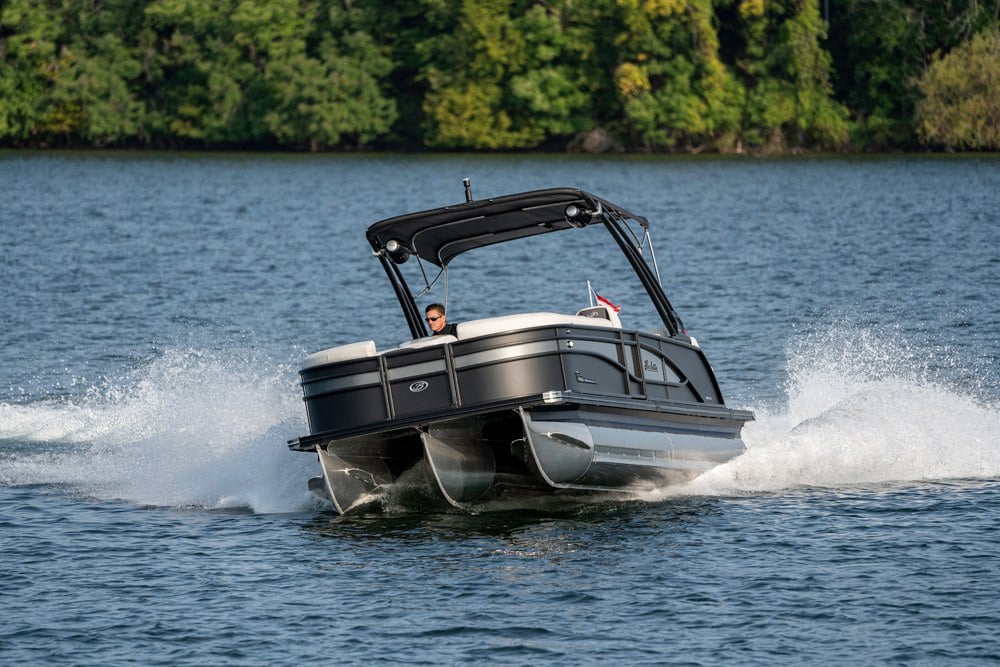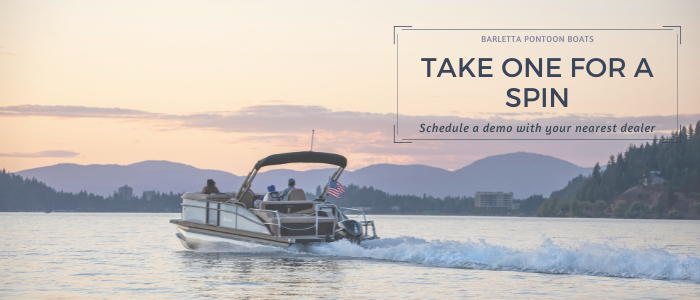How to Drive a Pontoon Boat: Step-by-Step Guide
If you’re new to the boating scene, you might be trying to soak up every bit of knowledge before hitting the water. I assume that’s what brought you to this blog and I commend you for wanting to learn everything you need to know in order to be a safe boater.
That said, if you’re new to boats or a first time pontoon boat owner, you may be wondering how to drive a pontoon boat. Well, you’re in luck because I'm going to tell you exactly how easy it is to do.
Operating a pontoon boat with an outboard engine is as easy as it gets. I’m going to explain the process from start to finish so that you know exactly what to do once you get behind the wheel of your pontoon boat.
How to Drive a Pontoon Boat
Tony with Barletta shows us step-by-step how to drive a pontoon boat.
Before you Take Off from the Dock
Know the Body of Water
As a life-long boater, the first thing you want to consider before taking off on your boat is the body of water you’re on. Make sure you get familiar with shallow spots, the current, underwater obstructions that could be detrimental if you hit them, and anything else that may apply to your location.
It’s also imperative that you are aware of the local and state laws as they apply to the body of water you’re boating on. A great way to do this is by taking a boaters safety course and obtaining your boating license.
Know Your Pontoon Boat
Once you know the lay of the land, make sure you’re comfortable with how the pontoon boat operates. You might have taken a demo ride before you purchased it but that doesn’t ensure that you know how the boat functions when you’re by yourself.
If you haven’t taken delivery of the boat yet, make sure to ask your dealer to do a test run with you and the boat before you take it home. Go through the dashboard, make sure you know how to start the motor, and have them show you around the electronics on board.
Knowing what buttons to press and which switches to flip before your maiden voyage will take some of the stress out of driving your new boat. Another important aspect is the safety features on board the pontoon.
Safety First
Be aware of any safety equipment you need to have on board at all times such as a fire extinguisher, a throwable flotation device, and of course enough life jackets for every person on the boat, just to name a few. The US Coast Guard offers an app that will tell you what equipment you must have by law which I highly recommend downloading for reference.
If you’re feeling confident about knowing the water, have all of your safety gear on board, and know your local boating laws, it’s time to batten down the hatches and get moving. Make sure all of your boat gear is secure in its place so that nothing flies off the boat when you take off.
Turn the Motor On
Next, turn the battery switch to the on position and head over to the captain’s seat. Once seated, attach the emergency stop lanyard to your person. This lanyard is typically a bright red cord attached to the emergency stop switch. Make sure the switch is flipped to “RUN”.
If you store the boat with the motor trimmed all the way up out of the water, go ahead and trim it down so that the propeller is in the water before you start the boat. Once the prop is submerged and the engine is tilted to the degree you want, turn the key and start the motor.
A couple things to remember if the engine is not starting. First, the throttle must be in the neutral position for the boat to start. The engine will not start if the throttle is in gear. Also, make sure that the emergency stop switch is flipped all the way to “”RUN”. If the switch is not completely flipped, the motor will not start.
Time to Cruise
Once you get the boat started, check your gauges. Make sure the battery voltage is where it should be, the temp is regulated, and you have enough fuel for your outing. If all is good, it’s time to pull the dock lines. Hopefully you have a co-captain that will handle the push off. If not, make sure you don’t leave your seat before detaching the emergency lanyard.
Pull away from the dock by moving the throttle out of neutral and into forward slowly. Once you have cleared the dock, make sure you are aware of the speed restrictions and signage that lead to the open water.
The Pontoon is now Underway
Learn how to Use the Throttle
Once you’re cruising, the pontoon is simple to operate. Practice using the throttle to speed up, slow down, reverse, and stop the boat. While you’re underway, slowly move the throttle into reverse and get a feel for the stopping power.
It’s true, there are no actual brakes on a boat. However, throwing the throttle in reverse while underway will act sort of like a brake and bring the boat to a halt quicker than if you just put it in neutral.
If you’re familiar with driving a car, the throttle is just like your gear shifter. Neutral will act as park in that the motor is running, but the propeller is not moving. Pushing the throttle forward will act as drive and will propel you forward. The more you push the throttle forward, the faster it will go.
If you pull the throttle backwards into reverse, that’s the “brakes”, that’s how you stop a forward moving boat as I mentioned above. If the boat is in neutral already and you put the throttle in reverse, that’s reverse.
Trim the Engine
Driving a pontoon boat is simple once you learn the basics and get comfortable with how the boat operates. Another step of the process is knowing how to utilize the trim function. The trim has two main purposes which are; move the propeller away from the ground in shallow water and contribute to the overall performance of the boat while it’s underway.
The best way to learn how to trim is by practicing in deep water and getting a feel for how it affects the boat while underway. As a life-long boater, I use the trim function by sound and feel as I have learned how it operates over time. It can drastically change the performance you get out of your boat.
The trim function will also be important when you’re boating in shallow water. You will want to trim the motor up in these spots as hitting the ground can damage the propeller. Just the same, be aware of the wind and current you’re experiencing.
Use the Power
Because of their shape and the way they’re built, pontoon boats act as a sail in heavy winds. If there’s a strong breeze while you’re boating, be cognisant of the fact that the boat will be harder to maneuver and may need extra power from the motor.
You’re the Captain Now
So there you have it, driving a pontoon boat is a breeze once you get the hang of it. When I first started driving the boat, my biggest obstacle was overcoming nerves. Take my word for it, there’s nothing to be nervous about.
Operating a pontoon boat has got to be one of the easiest types of boats to drive. Practice will make perfect, so get out there and hit the water. A great resource before you jump in is your dealer. If you’re unsure what the buttons do or how the trim works, have your dealer walk you through all of those questions upon taking delivery of the boat.



